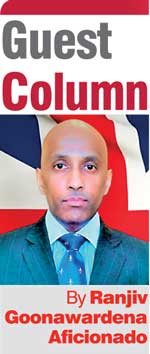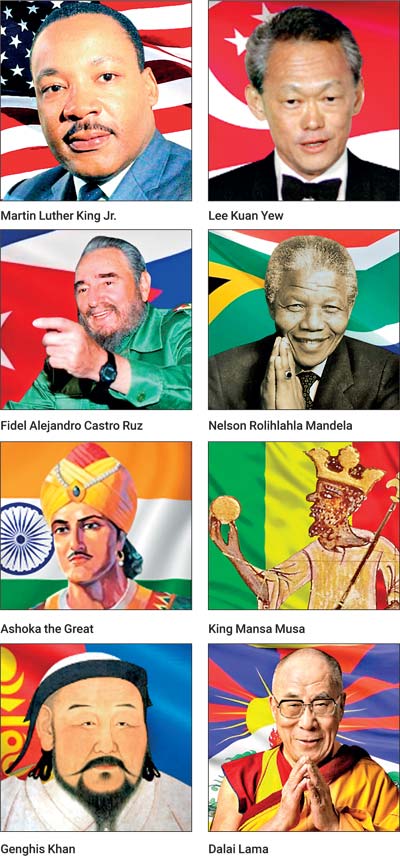Tuesday Feb 17, 2026
Tuesday Feb 17, 2026
Saturday, 18 June 2022 00:10 - - {{hitsCtrl.values.hits}}
 Most individuals make the error of judgement, thinking that a politician is a magic formula for a leader.
Most individuals make the error of judgement, thinking that a politician is a magic formula for a leader.
What do I mean? Leaders listen for what people need and show them the way; they are problem solvers. Unfortunately, the democratic institution that we have around the world is flawed, because the system that we have produces politicians not leaders. It doesn’t produce genuine leaders and so you can have a politician who knows nothing about leadership and he’s leading you or the nation into a disaster. A true leader has a vision and puts the people first. A vision is long-term, not only short-term focusing on the next election.
Politicians are mainly concerned about the next election, that’s all they’re really interested in.
That’s why they cannot be true leaders, for true leaders are different. Leaders are concerned about the next generation and the growth of the nation for everybody’s development.
I want you to compare those two thoughts the next time you have a politician coming to your neighbourhood or house wanting to vie for your vote. Just ask the politician, “What is your vision for my children or the nation? I will sit and listen for 10 minutes for you to tell me what it is.” Most probably the politician will beat a hasty retreat and leave your neighbourhood or house because he has no interest in your children’s welfare or nation, his concern is to stay in power to keep the position, to win the next election.
This is why politicians cannot lead. When you are going to have a conversation with a politician, you should actually try this as a test.
You, by the way, as a citizen of the nation, have the democratic, constitutional right to make an appointment to be heard by your elected representatives, may that be a parliamentary MP or local council member.
You must realise that the representative who has been appointed to high office is through your vote and therefore you have a right to see them. You can make an appointment to see any public officer you voted for; did you know that? That’s your legal right in a constitutional democracy. If they refuse to give you an appointment, you can take your elected representatives to court citing dereliction of duty bringing the office into disrepute. That’s democracy, therefore I would advise you to make an appointment to go and see your parliamentary MP or a local council member and just sit there and say, “I want 15 minutes with you.”
Test the mental fortitude of your elected representative to assess if fit for purpose, by asking the following questions:
a) What is your purpose for being in leadership in this country or city?
By asking the first question of this nature, you make the political representative very nervous and ponder on their inner motives.
Second question
b) What is your passion for our nation? He’ll be wondering what on earth you’re talking about. The answer must definitely not be building airports, harbours and roads, providing jobs – no no no. What is your elected representative’s passion, vision for the people?
This is why you need to question the elected representatives; you have to determine if they have a moral compass or not.
Otherwise, you get the wrong people representing your interests which will be to your detriment, thereby the blind leading the blind.
The fundamental aspects to take away from this article are the following:
1) Politicians focus on programs, not vision
2) Politicians are interested in the short term, not the long term
3) Politicians’ priority is securing the next election, not securing the next generation, by doing the least
4) Politicians’ focus is different, they are infamous for telling people what they want to hear
5) Politicians are preoccupied with promises, not with purpose
 What is required in modern times is a person who could be considered as a statesman. We don’t need more politicians. A statesman thinks of the next generation of the nation, unlike a politician.
What is required in modern times is a person who could be considered as a statesman. We don’t need more politicians. A statesman thinks of the next generation of the nation, unlike a politician.
Some leaders are born to greatness. Some rise during their tenure in office. And some achieve it only after they have stepped down. Historiographers of modern times arguably agree that all leaders have their deficiencies, as they say, no one is perfect in all genres of faculties but there have been a few exceptional candidates who would be deemed as leaders worthy of the title; for instance:
Ashoka the Great, was an Indian emperor of the Maurya Empire, son of Bindusara, who ruled almost all of the Indian subcontinent from 268 to 232 BCE. Ashoka promoted the spread of Buddhism across ancient Asia. Not only that, but chroniclers have stated his model rule based on peace and compassion that helped in unifying the culturally diverse empire under a centralised administration.
Genghis Khan of the Mongol Empire created the largest empire known to modern man from Mongolia all the way to Eastern Europe. He came to power by uniting many of the nomadic tribes of the Mongol steppe and being proclaimed the universal ruler of the Mongols. Regarded as one of the greatest military leaders the world has ever known, he conquered more than twice as much land as any other person in history. Many of these leadership lessons can be directly applied to business today. King Mansa Musa was the ruler of the Kingdom of Mali from 1312 C.E. to 1337 C.E. During his reign, Mali was one of the richest kingdoms in the world. His wealth came from mining significant salt and gold deposits. He was a very successful military leader. The Mali Empire more than tripled in size and had significant influence in several modern-day countries including Mauritania, Senegal, Nigeria, Burkina Faso, Chad, Guinea, Ghana and the Gambia. It has been chronicled when he made the pilgrimage to Mecca. He generously distributed gold. His wealth and prodigality dazzled all who witnessed it and his fame spread throughout the Islamic, Christian world and beyond.
Martin Luther King, Jr. was a civil rights activist titan. In the mid-1950s, Dr. King led the movement to end apartheid and counter white racism against black people in the United States through the means of peaceful protest. His speeches, some of the most iconic of the 20th century, had a profound effect on the national consciousness. Unfortunately, racism is a major handicap that still permeates through American society to date.
Fidel Alejandro Castro Ruz, supremo, was a Cuban revolutionary and politician who was the leader of Cuba from 1959 to 2008. Historians have stated he was instrumental in emancipating parts of Africa from colonial control and that also applies to Central and South America. He was instrumental in converting Cuba, and the wider world, from a capitalist system in which individuals own the means of production into a socialist system in which the means of production are owned by the workers or state.
Lee Kuan Yew is widely recognised as the modern architect of Singapore, which was a mosquito-infected mangrove island that turned into a metropolis. He transformed it into a developed country with a high-income economy within a single generation. In the process, he forged a highly effective, anti-corrupt government and civil service. Singapore is widely regarded as one of the safest countries in the world, with consistently low crime rates, and a transparent legal system.
Nelson Rolihlahla Mandela was a South African anti-apartheid and political leader who served as the first president of South Africa from 1994 to 1999.
He was the country’s first black head of state and the first elected in a fully representative democratic election.
Mandela showed true heroism under adversity, through his selfless and dedicated acts, by fighting to bring liberty and justice for his people, and risking his life for the equality of all.
The 14th Dalai Lama, known as Gyalwa Rinpoche to the Tibetan people, is the current Dalai Lama, the highest spiritual leader and former head of state of Tibet. Living in exile, in contrast, he achieved a level of visibility and global celebrity status that would have been unimaginable for his predecessors. He became the most famous Buddhist teacher in the world and is widely respected for his commitment both to nonviolence and to the cause of Tibetan emancipation.